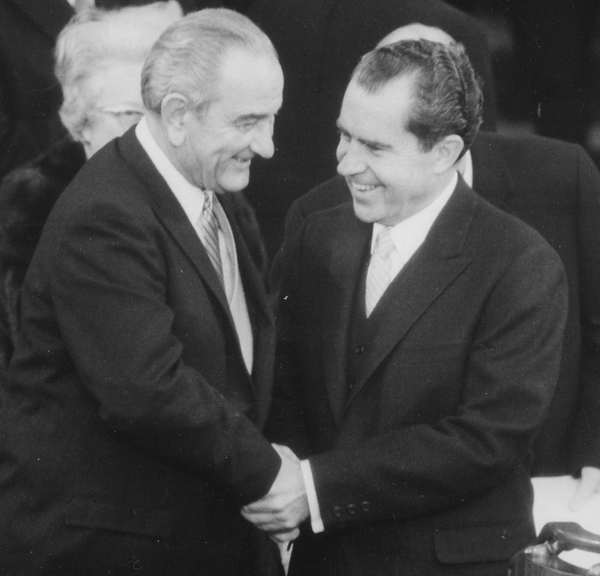The Year That Broke Politics: Collusion and Chaos in the Presidential Election of 1968
By Luke Nichter
Yale University Press, 396 pages, $37.50
It is the prerogative of journalists to write the first draft of history. But over time, we should expect their influence to fade. What is so strange about the pivotal presidential election of 1968 is that this never happened. The journalistic account of the developments that took hold that year has continued to dominate Americans’ understanding of events. Thus, many regard the 1968 election as the moment when American liberalism was unjustly unseated by Tricky Dick Nixon. It takes a courageous historian to challenge this narrative. That is just what Luke Nichter does in his new book, The Year That Broke Politics: Collusion and Chaos in the Presidential Election of 1968.
The conventional narrative goes something like this: In the spring of 1968, President Lyndon B. Johnson, dismayed by the failures of the Vietnam War and the Great Society, decided not to run again. By checking himself out of politics, Johnson threw the race wide open. The assassination of Martin Luther King Jr. and the third-party candidacy of the segregationist George Wallace showed that America had regressed on race. Robert F. Kennedy ran to replace Johnson, promising to end the Vietnam War. However, his assassination forced the Democratic Party to settle for Vice President Hubert Humphrey as its nominee. Meanwhile, Richard Nixon clinched the GOP nomination and pulled ahead of Humphrey by pursuing the “Southern Strategy,” courting racists who would otherwise have voted for Wallace. As the Vietnam War worsened, Humphrey struggled to come out from under Johnson’s shadow. When he finally did at the end of September, he reached polling parity with Nixon. As the race tightened, Johnson saw an opportunity for peace in Vietnam, and on Oct. 31, just before Election Day, he ordered a bombing halt. The “peace dividend” looked like it would boost Humphrey over Nixon. But Tricky Dick sabotaged the prospects for peace by using a secret emissary, Anna Chennault, to tell the South Vietnamese to boycott the talks. So Nixon squeaked through, Johnson left office, and America entered a darker age.
Nichter offers sympathetic and sometimes tender portraits of all the year’s major actors. Along the way, his book dismantles much of this conventional wisdom by putting Johnson back at the center of the story. Far from withdrawing from politics, Johnson was 1968’s central protagonist. Frustrated with how younger activists within his party were seeking to sweep him and his achievements into the dustbin of history, Johnson sought to secure his own legacy; and in his search for a successor, he settled on a surprising choice: Nixon.
“The 1968 race wasn’t as close as is often claimed.”
